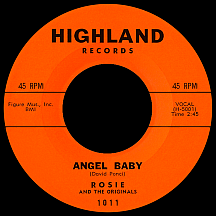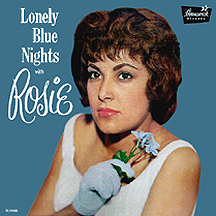ROSIE AND THE ORIGINALS
Angel Baby
This was one of those songs I heard in the darkness, late at night, coming from the transistor radio next to my pillow as I gazed out the window by my bed, watching the blinking lights from the occasional airplane that flew overhead. The haunting female vocal seemed to come from far off in the sky beyond wherever those planes were from, or were going. Certain songs possess an intangible, ethereal appeal and "Angel Baby" is one of them.
Red-haired Rosalie Hamlin (nickname: "Carrot") of San Diego (by way of Alaska), a 15-year-old Mission Bay High School student in 1960, had already been studying piano and writing poems for several years. Ambitious beyond the imaginings of most girls her age, she managed to book some studio time (in an old aircraft hangar converted to a studio, no less) to record, with a few of her friends, this song she'd written. The result was what one might call primitive, a prominent guitar intro by Noah Tafolla leading into Rosalie's high-pitched (but on-key) voice hitting notes in an extreme upper register, and a bad-audition-sounding sax solo (a little off-key) by Tony Gomez that, thanks to the limited studio time, wasn't redone. Despite the flaws, Rosalie and company felt they had something special. As it turns out, they did. The one other song from the session comes off like an impromptu quickie...and I'm sure that's exactly what it was. "Give Me Love" was, not surprisingly, even less gracefully executed than "Angel Baby." Its R&B-flavored vocal (purportedly by Bluford Wade, who was not one of Rosalie's school pals), Tafolla's unconventional rockabilly guitar backing and Gomez's saxophone going even further out of control, resulted in an off-kilter and appealingly raw three minute jam that has become legendary among fans of improvised madness.
Everything about this project was different from the norm, including the way they got the song noticed. Talking a San Diego department store manager into playing the acetate, the brief in-store exposure elicited positive reactions from customers, and a record distributor who was there at the time set the group up with a small label, Highland Records. "Angel Baby," credited to Rosie and the Originals, caught on quickly, an immediate Southern Cal sensation in November 1960. Entering the national charts in December, it went top ten coast-to-coast in January 1961.
Something unforeseen dampened Rosie's moment of glory: writer credit on both sides of the single had been given to David Ponci, one of her friends present at the session, leading to legal battles over royalties, something that was never completely explained or resolved to her satisfaction. The group broke up while the song was hitting its peak. Rosie, appearing solo on an Alan Freed rock and roll show, met Jackie Wilson, who took a liking to her and arranged a meeting with his manager, Nat Tarnopol, which led to a contract with Brunswick Records. When "Angel Baby" fell off the Billboard charts, she debuted the very next week with "Lonely Blue Nights" as Rosie formerly with the Originals, writing credits clearly posted on the labels as Rosalie Hamlin. Reasons why the follow-up wasn't as successful as hoped for? For one, it was very similar to the Angel-ic hit, but in a polished, big-label way. The sound was ever-so-slightly sanitized; those formidable rough edges had been smoothed out...that is, with the exception of the sax solo which ventured beyond the off-key "Baby" bridge to flat-out flat notes, eliciting a "Why'd they do that?" reaction from listeners. But perhaps what really held it back was the common difficulty many artists have in following one big hit with another.
There was just one other Brunswick single, the all-too-similar ballad "My Darling Forever." Guitarist Tafolla, who continued working with Rosie, later became her husband and by 1963 the two had left the business and settled into raising a family. She reappeared a couple of times in the late '60s and early '70s with a few single releases and has performed for audiences occasionally over the years. John Lennon, in a 1969 Rolling Stone magazine interview, talked about his admiration for Rosie's record, even playing the flip, "Give Me Love," during the interview, calling it "one of the greatest strange records...I talk Yoko's leg off, telling her this is it, this is what it's all about." During the Phil Spector-produced sessions for Lennon's 1975 album Rock and Roll, he recorded "Angel Baby." The track begins with a spoken introduction: "This here is one of my all-time favorite songs...send my love to Rosie, wherever she may be."



